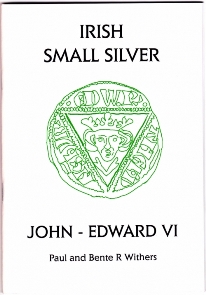Home/Index
Anglo-Irish mints...
John I
Edward I
- Dublin
- Waterford
Edward III
- Dublin
English mints...
Henry III
Edward I
Edward II
Edward III
Richard II
Henry IV
Henry V
Henry VI
Edward IV
Richard III
Henry VII
Henry VIII
Edward VI
Fakes & Counterfeits
 RSS Updates RSS Updates
Bibliography
Reference Books for sale
FREE Coin Appraisal
Search this site
Recommended...
|
Overview:
The farthings of John must have remained in circulation in Ireland well into the reign of his son Henry III, for in 1250 Henry granted Dublin certain tariffs on goods for "for the enclosing and strengthening of that city." This grant lists a number of goods to be taxed at one "quadrans" which was the medieval latin term for a farthing.
Henry III, Lord of Ireland¹:
Grant of Tolls in Dublin, 1250
Another grant of the same type as the one made in 1233 to Dublin was made for the same purpose in 1250. This list is much more complete, and indicates a greater traffic or a resort to more desperate measures for raising the necessary funds. The two Dublin grants, because of their temporary nature and purpose, represent a departure from the strictly feudal type of toll, and more nearly resemble a modern tariff.
The King to all, etc., greeting.
Be it known that for all things, and for all salable merchandise coming into our city of Dublin, we have granted to the good and true men, our citizens of the same city, for three years, the following aids for the enclosing and strengthening of that city, namely:
- From every crannock of grain, 1 quadrans
- From every crannock of flour, either entering or leaving the port of Dublin, 1 quadrans.
- From every dolium of wine, 2 denarii
- From every dolium of honey, 4 denarii
- From every fleece of wool, 1 denarius
- From every dykker of hides, 1 denarius
- From every dykter of deer skins, goat skins, or horse hides, an obole
- From every large ship, 16 denarii
- From every small ship, 8 denarii
- From every piece of English or foreign cloth, 1 obole
- From every piece of Irish cloth, 1 quadrans
- From every crannock of woad, 2 denarii
- From every crannock of salt, entering or leaving the said port, 1 quadrans
- From every bar of iron, 1 obole
- From every mesa of herrings, entering or leaving the said port, 1 quadrans
- From every ox, cow, or mare, 1 denarius
- From eight sheep, 1 denarius
- From every hog or side of bacon, 1 quadrans
- From a hundred boards, 1 quadrans
- From a hundred horse-irons, 1 obole
- From every pisa of onions, or butter, or fat, 1 obole
- From every hundred pounds of pepper, 2 denarii
- From a hundred pounds of wax, 2 denarii
- From a hundred pounds of alum, 2 denarii
- From every mill-stone, 1 obole
- From every hundred ells of linen cloth, 1 denarius
- From every hundred ells of canvas, 1 denarius
- From every load of lead, 2 denarii
- From every crannock of beans, 1 quadrans
- From every dozen kitchen utensils, 1 obole
- From every hundred pounds of metal, 1 denarius
- From every hundred pounds of fat pork, 1 denarius
- From a hundred pounds of fat, 1 denarius
- From merchandise to the value of 3 solidi, 1 quadrans
- From one hundred lamb-skins, 1 obole
- From one hundred squirrel-skins, 1 denarius
- From one hundred pounds of pitch, 1 obole
- From every load of iron, 1 obole
- From every dozen linden cords, 1 quadrans
Witness, the King, at Bistlesham, on the thirtieth day of May
¹ GILBERT, JT. (ed) 1870: Historical and Municipal Documents
of Ireland (London, Longmans). pp 124-125
Can't find your coin?
|


![Validate my RSS feed [Valid RSS]](../valid-rss.png)